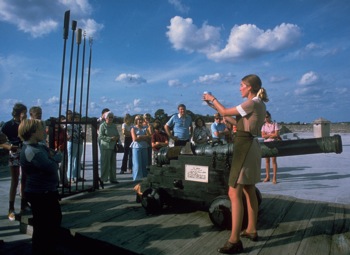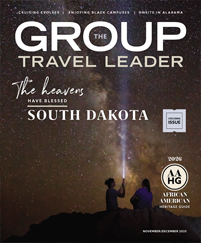
Courtesy National Park Service
ORLANDO, Fla. — The Great Recession has produced American leisure travelers who are more resourceful in maintaining their ability to travel, treating it as a birthright, which could bode well for the travel industry this year, according to a new survey.
“Despite what some economists say, consumers don’t feel the recession is ending, but they have become more resourceful,” said Peter Yesawich, chairman and CEO of Ypartnership, who compiled the 2010 Portrait of the American Traveler in conjunction with the Harrison Group. “They have a renewed sense of confidence in their ability to maneuver the financial uncertainty that still prevails and moderated their shopping and consumption behavior accordingly.”
Travelers are relentlessly looking for deals and special offers, trading down and waiting for sales before booking a trip.
Yesawich said 67 percent of those surveyed said they would take the same number of leisure trips this year as last, when they averaged four trips and spent more than $3,500 on leisure travel services.
Although there was only a 2 percent difference, Yesawich said he was encouraged by the fact that more people said they plan to take more trips in the year ahead (16 percent) than those who said they would travel less (14 percent). Among affluent households with annual incomes above $125,000, the difference was more striking, with 20 percent planning to take more trips compared with only 9 percent who plan to take fewer trips.
“The results augur well for the travel industry,” said Yesawich. “The demand for leisure travel should grow modestly in the year ahead, led by the more affluent households. We hope it is an example of how we are turning the corner.
“Although the new resourcefulness of consumers suggests that value will remain in vogue when it comes to vacations for months to come, the trend is reassuring to many travel service suppliers, as it reaffirms once again that to most consumers, a vacation is truly a birthright.”
Yesawich said the economy has had the unexpected benefit of making people happier with themselves. “They have become intensively resourceful, and instead of feeling deprived, people feel smart and proud of themselves,” he said. “For those who have not lost their jobs, it has made people happier.”
Seventy-nine percent of the respondents said they have become happier over the past 10 years.
Among other findings of the survey:
• More than one out of four leisure travelers took a last-minute trip during the past year, trips that were planned an average of just six days prior to departure. Such decisions are expected to become more popular as “flash sale” e-mails promote more last-minute discounts.
• People are environmentally conscious but are not prepared to pay suppliers a premium to be environmentally responsible.
• Nearly half of all travelers maintain a personal profile on a social networking site — Facebook was by far the most popular — but they do not rely on the content of these media to guide their travel decisions.
• California and Florida are the top two states for dream destinations, followed by Hawaii, Alaska, New York and Colorado.
• Specific dream destinations in the United States, in order, are the Hawaiian “neighbor” islands, national parks, Honolulu, the Florida Keys, Las Vegas and San Francisco.
Ypartnership and the Harrison Group polled just over 2,500 U.S. households in February that had taken at least one overnight leisure trip of more than 75 miles in the previous year and had annual household incomes of more than $50,000.









